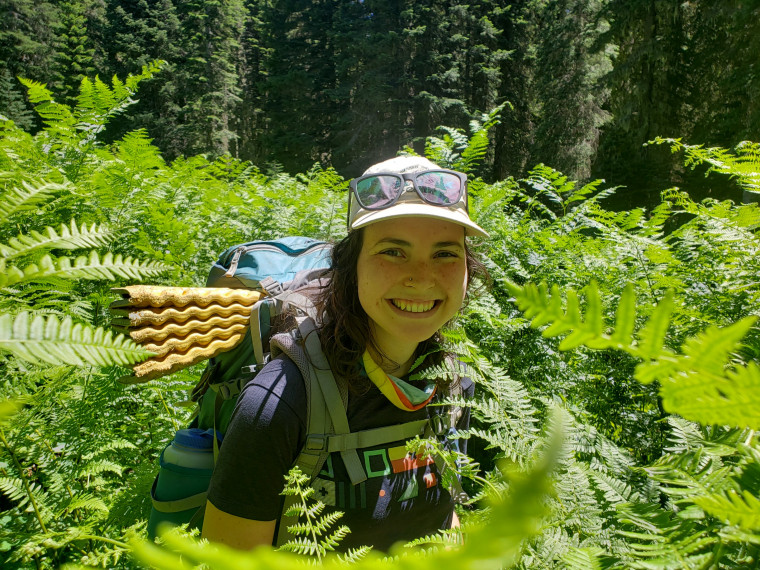Elise Pfrommer
The most important thing I learned at Lewis and Clark is how to communicate across different identities and/or worldviews. The Environmental Studies Program really focuses on this skillset, and I use it every day, whether I am talking with my students, fellow teachers, or agricultural producers.

Pronouns
Degree and Class Year
Hometown
Current City
Major
Minor
Extracurriculars
Overseas study
Job Title, Organization
What three words would you use to describe L&C?
What made you want to come to Lewis & Clark?
I knew I wanted to go to a small, liberal arts school where I would be able to take classes in a variety of disciplines and have close relationships with my professors. Then, I fell in love with Portland and Lewis & Clark seemed like the perfect fit.
What have you been doing since graduation?
After graduation, I moved to Ashland, Oregon, with my partner and our dog and started working as an elementary school garden educator. I’m finishing up my second school year in this role and am loving it more than ever!
How did Lewis & Clark prepare you for your job?
My work has many different aspects, from lesson planning to maintaining two large gardens to translating nutritional and culinary resources. At Lewis & Clark, I was always taking a variety of classes in different disciplines and using my brain in different ways. This definitely serves me well in my job now!
What would you say is the most important thing you learned at Lewis & Clark?
The most important thing I learned at Lewis and Clark is how to communicate across different identities and/or worldviews. The Environmental Studies Program really focuses on this skillset, and I use it every day, whether I am talking with my students, fellow teachers, or agricultural producers.
Why did you major in Environmental Studies?
I was first drawn to the ENVS program because I love to be outside and am really interested in how humans and the non-human world interact. I knew I wanted to be an ENVS major once I learned about how interdisciplinary the program is and how much room there is for you to create your own area of focus for your studies. I have always liked to look at issues from multiple viewpoints and knowledge bases, and the Environmental Studies Program was the perfect place to do that.
Why did you minor in Latin American Studies?
I’ve been learning Spanish since I was 11 and have had the opportunity to spend a good deal of time in Latin America since then. I am passionate about speaking Spanish and how it opens doors for communication with so many people, and also recognize that language doesn’t exist in a vacuum and is incredibly intertwined with the history and culture of its speakers. So, the LAS program was an amazing place to get to practice my Spanish while learning about the different worldviews, events and cultures that have shaped the language.
How do you stay connected to Lewis & Clark as an alum?
Each summer, I come back to Lewis & Clark to help lead New Student Trips with College Outdoors. It is amazing to be able to reconnect with the community in this way and get to welcome in the newest cohort of students.
How do you describe the liberal arts?
The liberal arts are transformational. Being able to look at topics from many different disciplines and viewpoints nurtures your mind in an amazing way and allows you to see more of the many, many connections that exist between subjects.
What was your favorite class? How did it expand your knowledge?
My favorite class I took was (Un)Natural Disasters with Professor Liz Safran. This class changed the ways I look at natural disasters and human interaction with the biosphere, but perhaps more importantly, opened my eyes to different manners of storytelling and how rhetoric impacts our perception of reality. I also really appreciated how Liz gave us an opportunity to create resources that were used in the community by disaster preparedness groups.
If you studied overseas while at Lewis & Clark, how did you choose your program? What did your overseas study add to your L&C experience?
I participated in the Border Studies Program, based out of Tucson, Arizona. This program was incredibly impactful for me, as living on the US/Mexico border changed how I see the world and I left the program feeling more empowered than ever to participate in activism toward our collective liberation.
More Admissions Stories
Admissions is located in Frank Manor House on the Undergraduate Campus.
MSC: 32
email admissions@lclark.edu
voice 503-768-7040
fax 503-768-7055
Vice President of Admissions and Financial Aid
Eric Staab
Admissions
Lewis & Clark
615 S. Palatine Hill Road MSC 32
Portland OR 97219

